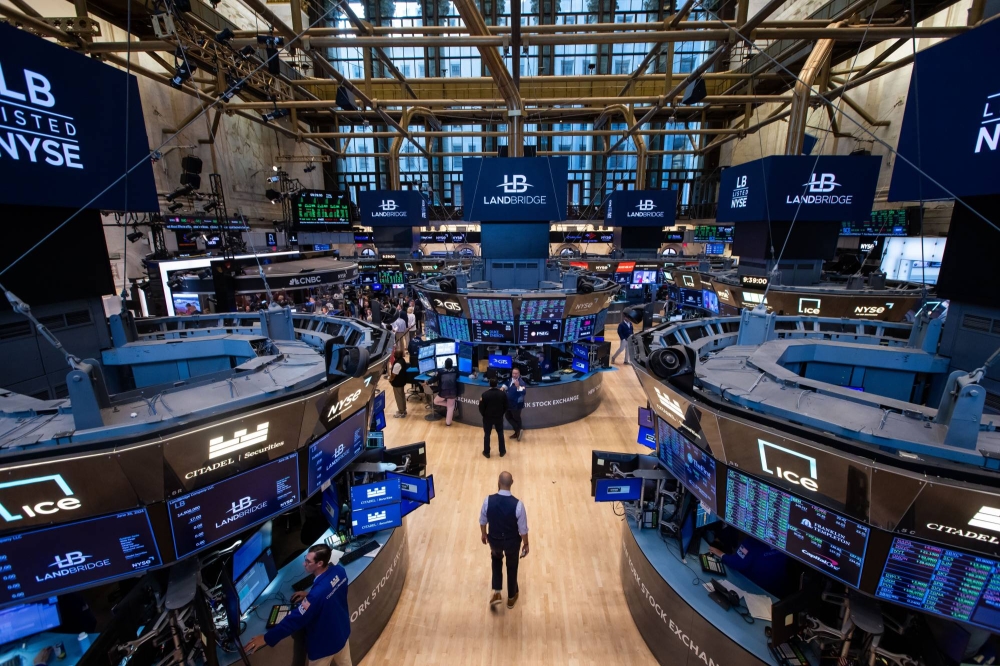A drop in heavyweight stocks that have driven markets higher this year highlights Wall Street’s sensitivity to Big Tech trade difficulties and raises concerns that overstretched stocks could experience further turmoil
The tech-heavy Nasdaq Composite experienced its worst day since Wednesday, October 2022, plummeting 3.6% in response to disappointing quarterly reports from Tesla and Alphabet, Google’s parent company.
The S&P 500, the benchmark index, experienced a 2.3% decline due to the earnings reports, which raised concerns regarding the forthcoming results of other major technology companies.
After Tesla reported its lowest quarterly profit margin in five years, Thomas Martin, senior portfolio manager at GLOBAL, stated, “This was the hair trigger for people saying, ‘Wow, I’ve got way too much exposure to information technology and grow their type companies.'” “The trade … is to get more diversified.”
After a months-long rally in a handful of significant technology and growth companies, including chipmaker Nvidia, Microsoft, and Amazon, which was driven by optimism about artificial intelligence technology, the rout has occurred. This rally has propelled the S&P 500 to record highs this year.
The trajectories of the mega-cap stocks, collectively termed the Magnificent Seven, are a critical determinant of broader markets’ performance. In 2024, they have contributed approximately one-third of the S&P 500’s 14% increase. This includes Meta Platforms and Apple.
Concerns regarding the overinflated valuations of companies increased as share prices increased, and comparisons to the dotcom mania of over two decades ago became more frequent. According to LSEG data, the S&P 500 is trading at approximately 22 times expected earnings, the highest level over two years and significantly higher than its 10-year average of 18.
In recent weeks, there have been indications of apprehension regarding technology equities, as the vigorous rally in numerous market leaders appeared to have reached its limit.
The increase in the Cboe Volatility Index, regarded as Wall Street’s anxiety gauge due to its ability to gauge the demand for portfolio protection, was one of the signals. On Wednesday, the indicator reached its highest point in three months.
Prime brokers at Goldman Sachs and Morgan Stanley reported in their notes last week that hedge funds have decreased their market exposure for the past two weeks.
This is due to concerns that the gains achieved earlier this year may be lost if the sentiment surrounding technology equities changes.
On Wednesday, hedge funds continued to deleverage their portfolios by selling long positions and covering bearish wagers, according to Andrew Volz, chief operating officer at prime broker Clear Street.
“There were general liquidations of things like Nvidia, Tesla, all the big seven tech companies,” Volz indicated.
Is Earnings Optimism Overdone?
Even though the S&P 500 is currently only 4% below its all-time high, achieved earlier this month, some investors are concerned that Wall Street may have become overly optimistic about earnings growth, which could leave stocks vulnerable if companies cannot meet expectations in the coming months.
Alphabet’s shares experienced a more than 5% decline on Wednesday, which is an illustration. Despite the company’s higher-than-anticipated revenues, investors expressed concern that the company’s increasing investments in AI infrastructure would erode margins, and YouTube was contending with fierce competition for advertising dollars.
Jake Dollarhide, the CEO of Longbow Asset Management, stated, “We established an excessively high earnings threshold.” “Even Alphabet’s earnings beat, but the market wasn’t impressed, and they didn’t beat by enough.”

On Wednesday, numerous Magnificent Seven equities experienced substantial losses. Tesla’s shares experienced their most significant daily decline since 2020, plummeting by over 12%, while Nvidia’s shares declined by 6.8%. There was a 3.6% decline in Microsoft shares and a 2.9% decline in Apple shares.
Investors are expected to remain anxious in the weeks ahead as additional tech earnings are reported following Wednesday’s selloff. Meta, Microsoft, and Apple are all scheduled to report next week, which could increase volatility if any disappoints or alleviate investor concerns if the results are robust.
“We are experiencing a slight setback.” However, Tim Ghriskey, senior portfolio strategist at Ingalls & Snyder in New York, believes it is temporary. “If we see some good numbers in the coming days, it could reverse just as quickly.”



